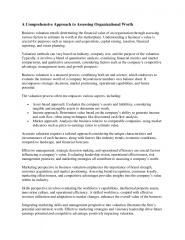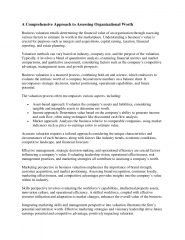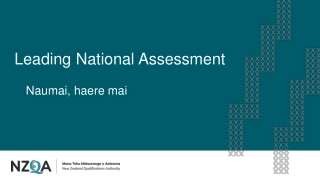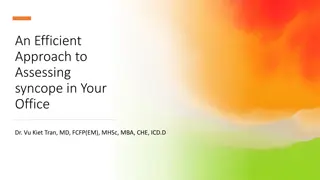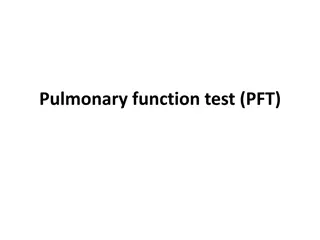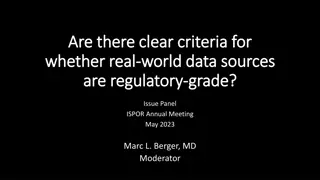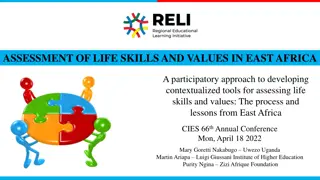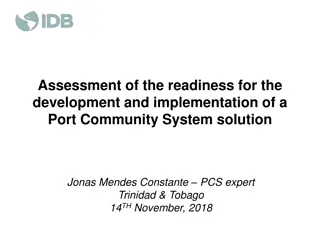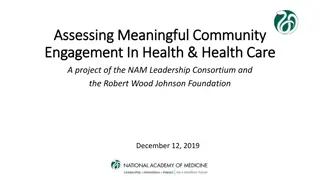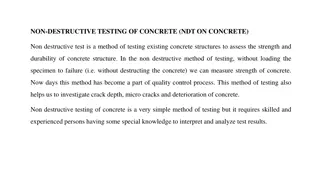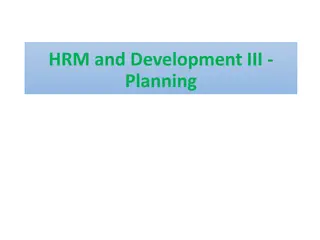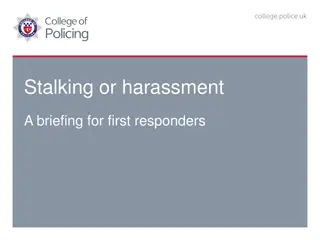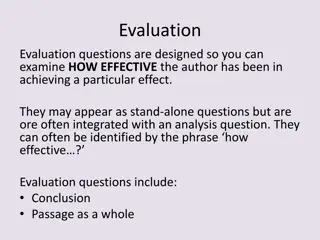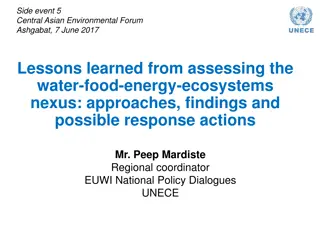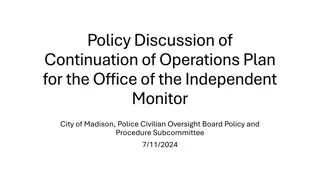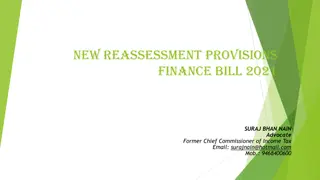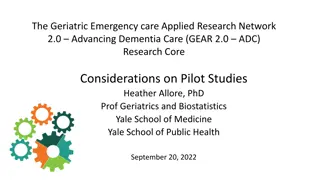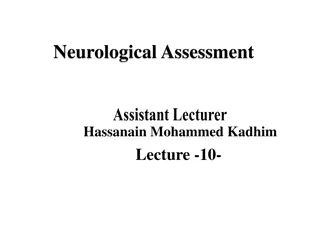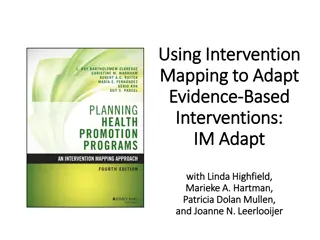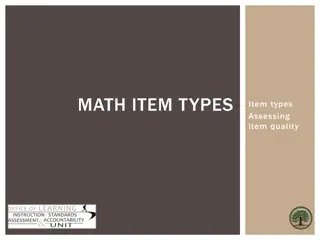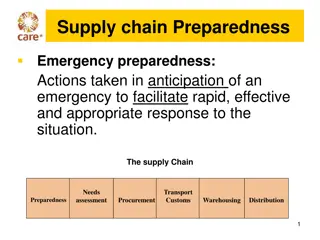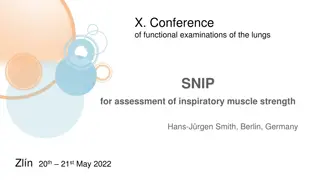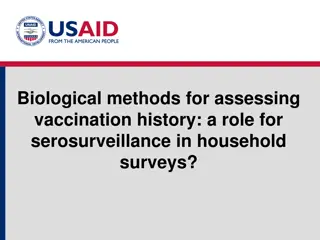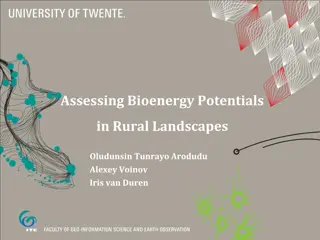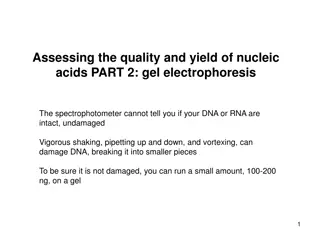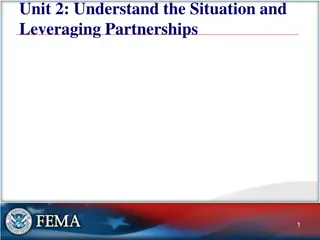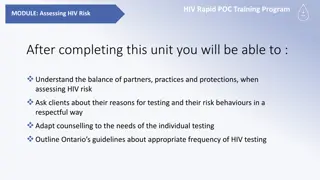A Comprehensive Approach to Assessing Organizational Worth
Business valuation entails determining the financial value of an organization through assessing various factors to estimate its worth in the marketplace. Understanding a business's value is crucial for purposes such as mergers and acquisitions, capital raising, taxation, financial reporting, and est
0 views • 2 slides
A Comprehensive Approach to Assessing Organizational Worth
Business valuation entails determining the financial value of an organization through assessing various factors to estimate its worth in the marketplace. Understanding a business\u2019s value is crucial for purposes such as mergers and acquisitions, capital raising, taxation, financial reporting, an
0 views • 2 slides
Leading National Assessment
Today's mahi involves preparing for the upcoming NCEA Change implementation in 2024. The seminar program covers NCEA Changes, Policies, Readiness planning, Quality Assurance, Corequisites Updates, Pilots & Digital External Assessments. New NZQA Assessment Rules have been published, setting the code
1 views • 37 slides
Scope of Jurisdictional Challenge in Income Escaping Assessment Proceedings
The jurisdictional challenge of income escaping assessment before the Gujarat High Court involves Sections 147 and 148A of the Income Tax Act. Section 147 allows the Assessing Officer to assess or reassess income that has escaped assessment for any assessment year, while Section 148A outlines the pr
1 views • 25 slides
Comprehensive Guide to Assessing and Prioritizing Child and Adolescent Health in Humanitarian Settings
This module provides a detailed operational guide on assessing and prioritizing child and adolescent health in humanitarian settings. It covers obtaining data on child/adolescent health, coordinating responses, planning activities, and utilizing data systems for monitoring and evaluation. Key compon
7 views • 31 slides
PRE-START TASK ANALYSIS(PSTA)
Pre-Start Task Analysis (PSTA) is a systematic process crucial for assessing and mitigating potential hazards associated with tasks. By identifying risks, assessing their impact, implementing control measures, and communicating effectively, PSTA enhances workplace safety by proactively addressing da
5 views • 6 slides
Efficient Approach to Assessing Syncope in Office Practice
Dr. Vu Kiet Tran discusses an efficient approach to assessing syncope in office practice, focusing on risk factors for sudden cardiac death, the use of ECG and CT scans, and differential diagnosis to identify cardiac causes of syncope. Through case studies and learning objectives, key aspects of syn
4 views • 103 slides
Assessing and Addressing Spiritual Needs
Explore the significance of assessing spiritual needs and providing spiritual care in partnership. Embrace reflective practices and learn key questions to assess spiritual needs effectively. Understand the dynamics of assessment and prepare for patient visits sensitively. Start the process of assess
0 views • 15 slides
Comprehensive Overview of Pulmonary Function Tests (PFTs)
Pulmonary Function Tests (PFTs) are vital for assessing pulmonary gas exchange through ventilation, diffusion, and lung perfusion. These tests include measurements of lung volume, airway patency, gas exchange efficacy, and pulmonary blood flow. PFTs offer benefits in diagnosing dyspnea, monitoring d
0 views • 14 slides
Understanding the Six Minute Walk Test for Assessing Functional Exercise Capacity
The Six Minute Walk Test (6MWT) is a valuable field test widely used in assessing functional exercise capacity in patients with pulmonary or cardiac compromise. It is safe, reliable, and provides valuable insights such as peak VO2 measurements. The test has shown good repeatability and reproducibili
1 views • 8 slides
Clear Criteria for Assessing Regulatory-Grade Real-World Data Sources
The discussion at the ISPOR Annual Meeting focused on defining regulatory-grade real-world data (RWD) sources as those of adequate quality for specific regulatory purposes. Panelists emphasized the importance of authenticity, transparency, accuracy, and track record in evaluating data quality. They
2 views • 5 slides
Assessing Life Skills and Values in East Africa: A Participatory Approach
Life skills education is crucial for children's development, yet its assessment varies across cultures. The ALiVE initiative in East Africa aims to enhance system capacities for assessing life skills and values. The ALiVE tool development process involved prioritization, contextualization, literatur
0 views • 7 slides
Assessing Readiness for Port Community System Development and Implementation
Evaluation of readiness for developing and implementing a Port Community System (PCS) solution presented by Jonas Mendes Constante, a PCS expert from Trinidad & Tobago in November 2018. The overview includes the methodology for assessing readiness, lessons learned, phases of port digital transformat
0 views • 17 slides
Assessing Meaningful Community Engagement in Health & Health Care
This project, led by the NAM Leadership Consortium and the Robert Wood Johnson Foundation, focuses on assessing and advancing the responsiveness of public and private programs to community needs. The goal is to enhance meaningful engagement with diverse audiences in shaping healthcare programs and p
0 views • 14 slides
Affinity Care Lipid Pathway Summary and Assessment
The Affinity Care Lipid Pathway outlines a systematic approach to assessing lipid/cholesterol blood results in individuals over 16 years old. It includes guidelines for managing cholesterol levels, assessing familial hypercholesterolemia, and determining appropriate medication options based on indiv
0 views • 5 slides
Exploring FOAMed: Assessing Asynchronous Online Learning Resources in Medical Education
In this comprehensive exploration of Free Open Access Medical Education (FOAMed), we delve into its origins, usage in medical education, and the development of assessment tools for blogs and podcasts. We learn about FOAM's democratization of medical education through various online resources and how
1 views • 13 slides
Importance of Non-Destructive Testing in Concrete Structures
Non-destructive testing (NDT) of concrete plays a crucial role in assessing the strength, durability, and quality control of structures. This method involves assessing properties such as density, strength, crack depth, and reinforcement location without damaging the concrete. NDT is essential for ve
0 views • 5 slides
Strategic Human Resource Planning: Process and Importance
Human Resource Planning is crucial for organizations to align their current workforce with future goals effectively. The process involves assessing current HR capacity, forecasting future requirements, conducting gap analysis, and developing strategies. Assessing skills inventory and performance eva
1 views • 24 slides
Responding to Stalking and Harassment: First Responder Briefing
Stalking and harassment pose significant risks that first responders need to recognize and address effectively. Recent reports have highlighted the importance of understanding the differences between these offenses, assessing risks dynamically, and prioritizing victim safety. New advice from the Col
0 views • 6 slides
Analysis of Evaluation and Conclusion Questions in Textual Analysis
Evaluation and Conclusion questions play a crucial role in assessing the effectiveness of an author in achieving specific effects and summarizing key points in a passage. These types of questions are commonly found in textual analysis tasks to evaluate the success of conveying ideas and themes. Eval
0 views • 9 slides
Lessons from Water-Food-Energy-Ecosystem Nexus at Central Asian Environmental Forum
Explore insights from assessing the water-food-energy-ecosystems nexus discussed at the Central Asian Environmental Forum. Mr. Peep Mardiste shares approaches, findings, and potential response actions. The UNECE Water Convention's framework, tools, and methodologies for assessing nexus relationships
0 views • 13 slides
Policy Discussion for Continuation of Operations Plan - City of Madison
This policy discussion focuses on developing a Continuation of Operations Plan (COOP) for the Office of the Independent Monitor in the City of Madison. The aim is to prepare a draft policy by assessing risks associated with staff absences and devising strategies to mitigate those risks. Steps includ
0 views • 17 slides
Ensuring Employee Fitness for Duty in the Workplace
Learn how to identify unfit employees, understand fitness for duty guidelines, use checklists, and handle unfit situations effectively. Supervisors play a crucial role in monitoring performance, assessing fitness, and following guidelines. Proper documentation and the Reasonable Prudent Person Test
0 views • 32 slides
Comparison of Old and New Reassessment Provisions in Finance Bill 2021
The Finance Bill 2021 introduces new reassessment provisions impacting the assessment of income chargeable to tax. Key changes include the amendment of Section 147 and the addition of Section 148, affecting the Assessing Officer's powers and procedures. These modifications aim to streamline the asse
0 views • 15 slides
The Role of CEO Recruitment Companies in Shaping Organizational Success
CEO Recruitment is a complex and high- stakes process. It involves not only assessing a seeker\u2019s chops and experience but also assessing their fit with the company\u2019s culture and strategic objects. A CEO Recruitment company plays a pivotal p
0 views • 6 slides
Pilot Studies in Advancing Dementia Care: Core Considerations
Pilot studies play a crucial role in exploring interventions, determining necessary modifications, assessing feasibility, and confirming stakeholder acceptance. They help in testing study protocols, assessing data collection procedures, and evaluating outcome measures. Feasibility studies are essent
0 views • 9 slides
Understanding Neurological Exams: Assessment and Procedures
A neurological exam evaluates a person's nervous system using various instruments in a healthcare setting. This comprehensive assessment includes evaluating motor and sensory functions, balance, coordination, mental status, reflexes, and cranial nerve functionality. Assessing mental status involves
0 views • 18 slides
Assessing Affordability and Financial Capacity for NPDES MS4 Permits
This content explores the assessment of affordability and financial capacity for implementing NPDES MS4 permits, examining indicators such as cost per household, median household income, debt indicators, and property tax revenues. It discusses EPA guidance from 1997, integrated water planning princi
0 views • 23 slides
Using Intervention Mapping to Adapt Evidence-Based Interventions
In this comprehensive guide, learn how to systematically adapt evidence-based interventions (EBIs) to new settings while retaining critical elements for effectiveness. Tasks involve needs assessment, logic model development, searching for EBIs, assessing fit, planning adaptations, implementation, an
0 views • 34 slides
Berlin 2024 International Conference on Assessing Quality in Higher Education Know Before You Go Session
The Berlin 2024 International Conference on Assessing Quality in Higher Education offers a platform for global dialogue on key themes in higher education. Participants engage in discussions on strategic directions, inclusive environments, innovative instruction, and student success. The event featur
0 views • 8 slides
Assessing Item Quality in Mathematics Assessments
Explore different types of items used in assessing quality outcomes in mathematics assessments including classification of item types, scoring methods, and selected response checklist for assessing the effectiveness and relevance of items. Learn about the advantages and disadvantages of using multip
0 views • 32 slides
Supply Chain Preparedness for Emergency Response
Actions are taken in anticipation of an emergency to ensure a rapid, effective, and appropriate response. This includes assessing supply chain needs, preparing transport and customs procedures, procurement, warehousing, and distribution. Elements of preparedness involve translating context, understa
0 views • 11 slides
Sniff Nasal Inspiratory Pressure (SNIP): Assessing Respiratory Muscle Strength
SNIP is a sensitive non-invasive test that measures inspiratory muscle strength by assessing nasal pressures during a sniff maneuver. It is a valuable tool for early detection of respiratory muscle decline, providing insights into potential threats like hypercapnic respiratory failure, impaired coug
0 views • 11 slides
Understanding Tephigrams: A Guide to Assessing Soaring Conditions
Tephigrams are valuable tools for determining ideal soaring conditions by displaying temperature and dew point information versus height, assessing thermal activity, and understanding atmospheric stability. They provide insight into dry and saturated lapse rate curves, wind information, and the char
0 views • 38 slides
Role of Serosurveillance in Assessing Vaccination History
This presentation discusses the use of serosurveillance in household surveys to supplement vaccination data collection by testing for biomarkers indicative of vaccination history. It explores the ideal biomarker for vaccination, differences between serosurveillance and vaccination coverage, limitati
0 views • 8 slides
Assessing Bioenergy Potentials in Rural Landscapes: A Holistic Approach
This study focuses on assessing bioenergy potentials in rural landscapes to address climate change challenges and depletion of fossil fuel reserves. By developing a holistic approach, the research aims to consider various factors impacting bioenergy potential under an SEA framework. Exploring altern
0 views • 16 slides
Gel Electrophoresis for Assessing Nucleic Acid Quality
Gel electrophoresis is a crucial technique for assessing the quality and yield of nucleic acids such as DNA and RNA. It separates DNA fragments based on size, allowing researchers to determine the integrity of the nucleic acids. By running a small amount of sample on a gel and using DNA-binding dyes
0 views • 9 slides
Understanding Disaster Engagement and Community Partnerships
This unit focuses on the six-step Engagement Process for effectively involving faith communities in disaster response. It covers tools for assessing damage, engaging religious and cultural groups, and leveraging partnerships. Key aspects include understanding the situation, identifying impacted area
0 views • 22 slides
Innovating Teacher Education with Technology and Assessing Student Outcomes
The FICCI School Education Committee has identified key focus areas such as technology integration in teacher education and assessing student outcomes. They have developed training videos for teachers and are advocating for the use of technology-based resources in education. Additionally, there is a
0 views • 7 slides
HIV Rapid POC Training Program - Assessing HIV Risk
This HIV Rapid POC Training Program module focuses on assessing HIV risk by understanding the balance of partners, practices, and protections. It covers topics such as introducing the testing conversation, assessing risk and client service needs, explaining the test and obtaining consent, performing
0 views • 29 slides
